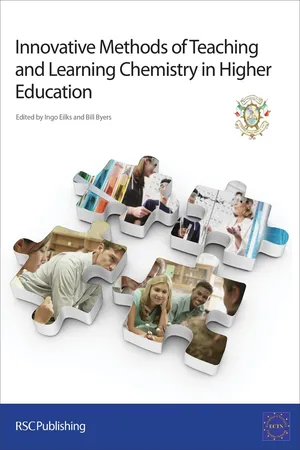
Innovative Methods of Teaching and Learning Chemistry in Higher Education
- English
- ePUB (mobile friendly)
- Available on iOS & Android
Innovative Methods of Teaching and Learning Chemistry in Higher Education
About this book
Two recent initiatives from the EU, namely the Bologna Process and the Lisbon Agenda are likely to have a major influence on European Higher Education. It seems unlikely that traditional teaching approaches, which supported the elitist system of the past, will promote the mobility, widened participation and culture of 'life-long learning' that will provide the foundations for a future knowledge-based economy. There is therefore a clear need to seek new approaches to support the changes which will inevitably occur. The European Chemistry Thematic Network (ECTN) is a network of some 160 university chemistry departments from throughout the EU as well as a number of National Chemical Societies (including the RSC) which provides a discussion forum for all aspects of higher education in chemistry. This handbook is a result of one of their working groups, who identified and collated good practice with respect to innovative methods in Higher Level Chemistry Education. It provides a comprehensive overview of innovations in university chemistry teaching from a broad European perspective. The generation of this book through a European Network, with major national chemical societies and a large number of chemistry departments as members make the book unique. The wide variety of scholars who have contributed to the book, make it interesting and invaluable reading for both new and experienced chemistry lecturers throughout the EU and beyond. The book is aimed at chemistry education at universities and other higher level institutions and at all academic staff and anyone interested in the teaching of chemistry at the tertiary level. Although newly appointed teaching staff are a clear target for the book, the innovative aspects of the topics covered are likely to prove interesting to all committed chemistry lecturers.
Frequently asked questions
- Essential is ideal for learners and professionals who enjoy exploring a wide range of subjects. Access the Essential Library with 800,000+ trusted titles and best-sellers across business, personal growth, and the humanities. Includes unlimited reading time and Standard Read Aloud voice.
- Complete: Perfect for advanced learners and researchers needing full, unrestricted access. Unlock 1.4M+ books across hundreds of subjects, including academic and specialized titles. The Complete Plan also includes advanced features like Premium Read Aloud and Research Assistant.
Please note we cannot support devices running on iOS 13 and Android 7 or earlier. Learn more about using the app.
Information
Training Programmes for Newly Appointed University Chemistry Teaching Staff
Introduction
Table of contents
- Cover
- Title
- Contents
- Preface
- The Need for Innovations in Higher Level Chemistry Education – A Pedagogical Justification
- The Uniqueness of Teaching and Learning Chemistry
- Context- and Problem-based Learning in Higher Level Chemistry Education
- Research-based Teaching in Higher Level Chemistry Education
- Practical Work in Higher Level Chemistry Education
- Cooperative Learning in Higher Level Chemistry Education
- Online Support and Online Assessment for Teaching and Learning Chemistry
- From Computer Assisted to Grid Empowered Teaching and Learning Activities in Higher Level Chemistry Education
- Learning from Industry and Employment
- Assessment in Higher Level Chemistry Education
- Training Programmes for Newly Appointed University Chemistry Teaching Staff
- Authors
- Index